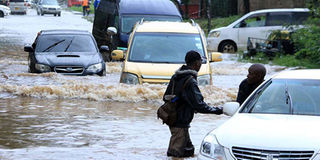To develop, we must learn to plan for the future

Motorists struggle to wade through a flooded road in Nairobi's South C on December 3, 2019. We must begin to build for the rainy season. PHOTO | JEFF ANGOTE | NATION MEDIA GROUP
What you need to know:
- Apparently, we cannot plan for the long haul, and we have difficulty cooperating for the long periods of time required to make teams truly ‘world-class’.
- The result is that our structures, having been constructed for the sunny season, are completely unprepared for heavy rains.
Kenyans are an ambitious people.
We have lofty aspirations and many of our institutions have ambitions of becoming ‘world-class’ something or other, and in keeping with these aspirations, we are known to develop some of the most impressive plans in the world.
Indeed, we are even known for the ability to implement lofty ideas, and when we are appropriately facilitated, we demonstrate our world-beating abilities.
The lack of support and facilitation can be squarely blamed for many of our failings, and the evidence of this is manifest in the kinds of games and sports we excel in.
We perform dismally in sports that require a lot of resources and support from the government or other official institution, and lead the world in individual sports.
Our long-distance runners are the best in the world, and currently hold all the world records in those races.
DIFFERENT TERRAIN
Our football team, on the other hand, has earned the reputation of being a serial heart-breaker through no fault of their own.
The same happens in other team sports, including rugby and ball games. This is the case because most of our athletes have an astounding amount of natural talent that they nurture with minimal resources or support from any official source.
The elite runner’s story has become a cliché. They are born somewhere in the Great Rift Valley; they run throughout their childhood — to school, to the river, to the market, literally everywhere.
At some point, a talent scout sees them in action, and the rest, as they say, is history.
Unfortunately, the same is not the case with sports that require more preparation, cooperation, and equipment than that we are born with.
POOR INFRASTRUCTURE
Apparently, we cannot plan for the long haul, and we have difficulty cooperating for the long periods of time required to make teams truly ‘world-class’.
While we pride ourselves in our ‘traditional African’ communal society and cooperation, the reality is that we have become more individualistic than those communities in the Global North that we like to accuse of the same.
This is better illustrated with what happens to our infrastructure whenever faced with torrential rains.
First, Kenyans find it difficult to work when it rains. Builders will halt their work at the first sign of rain, whether they are building a road, a bridge or an individual’s home.
CHANGING TACK
The result is that our structures, having been constructed for the sunny season, are completely unprepared for heavy rains.
Our roofs routinely leak whenever it rains. Our roads develop deep gullies and erosion during the rainy season.
Even our poorly maintained cars tend to break down on our roads during heavy rains. For us to truly lead from the front, we must change our ways. We must plan further ahead than our next meal and build structures that we are sure shall not occupy or use ourselves.
Only then will we realise our true potential and claim our place in the community of civilised nations.
Lukoye Atwoli is Associate Professor of Psychiatry, Moi University School of Medicine; [email protected]





